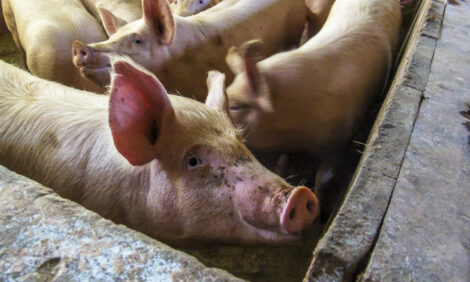



Herbal worm control a plus for organics, say researchers
NETHERLANDS - Studies by the Animal Sciences Group at Wageningen University in the Netherlands have proved that a non-pharmaceutical worming programmes, using specific plant extracts can be very effective..jpg) |
| Dutch research shows herbs can control gastro-intestinal worms in pigs |
The results are being seen as a huge breakthrough by organic pig producers, who find that controlling the worm burden in outdoor and straw based herds can be quite difficult.
Researchers found that including a specific herb mixture within grower and finishing diets did help to control mild infections of Ascaris suum, a common gut worm. Although the herbal preparation did not decrease the number of pigs that were infected with the parasite, it did reduce the average number of worms in the gastro intestinal tract.
Two different herb mixtures were tested. Both comprised on one per cent Thymus vulgaris, one per cent Melissa officinalis and one per cent Echinacea purpurea to the diet, although the second herb supplement also included adding one per cent Camellia sinensis (black tea.
The study compared four treatments:
- 1. Negative control: no treatment was applied to prevent or control an infection with Ascaris suum;
- 2. Positive control: pigs were treated with a conventional anthelmintic (Flubendazole) one week before slaughter;
- 3. Herb mixture: pigs were fed a diet supplemented with herb mixture;
- 4. Herb mixture + tea: pigs were fed a diet supplemented with a herb mixture (as treatment 3) plus black tea.
The experiment was conducted with 32 young boars with an average start weight of 24 kg. They were healthy and purchased from a Specific Pathogen Free source farm. The pigs were infected with 1000 worm eggs and then monitored for 67 days in the period December 2006 until February 2007.
 |
| Organic enteprises could benefit from combination worming programmes |
The outcome proved that the synthetic wormer (Flubendazole) offered the most effective internal parasite control. The herbal supplement did have a positive effect but the addition of one per cent black tea offered no advantage.
However, for organic herds, researchers suggested that using a combination of a conventional anthelmintic and a diet containing the herb mixture would probably be a viable option, particularly on farms with a low worm burden.
In practical terms, the level of worm infection would determine if a herb enhanced diet for the entire herd would be adequate to deworm sows, weaners and/or growing finishing pigs and keep the level of Ascaris suum at an acceptably low level.
Further Reading
|
|
- Go to our previous news item on this story by clicking here. |








